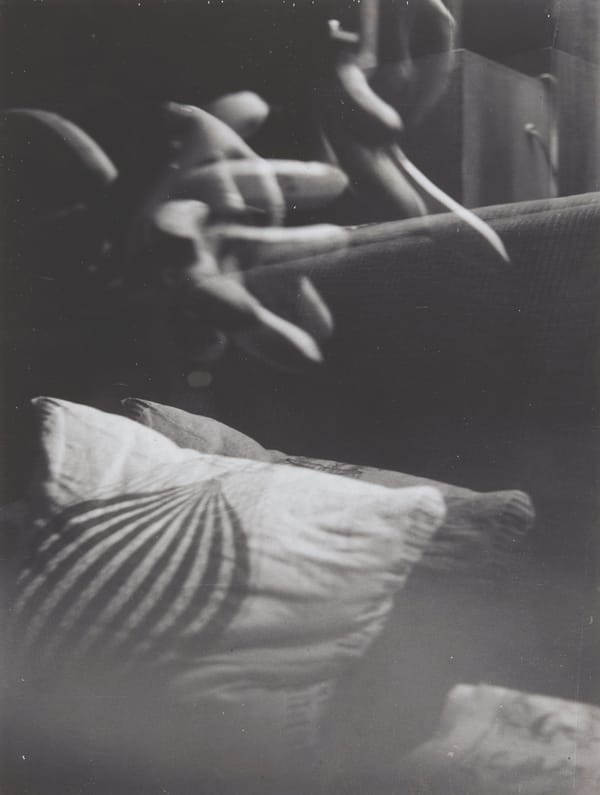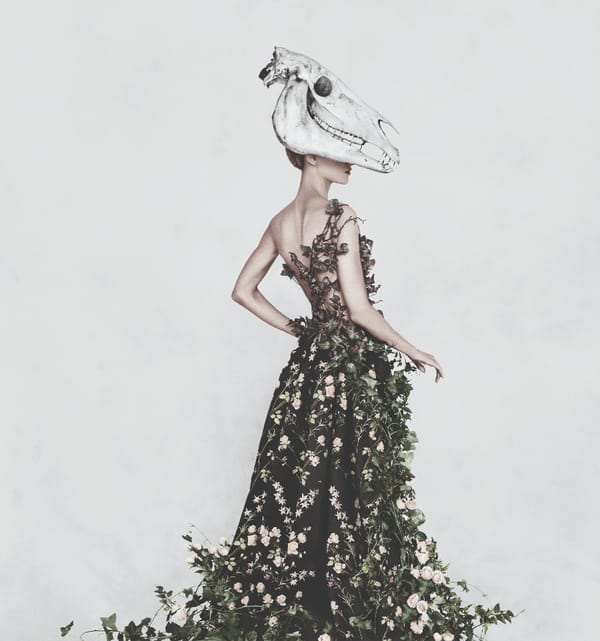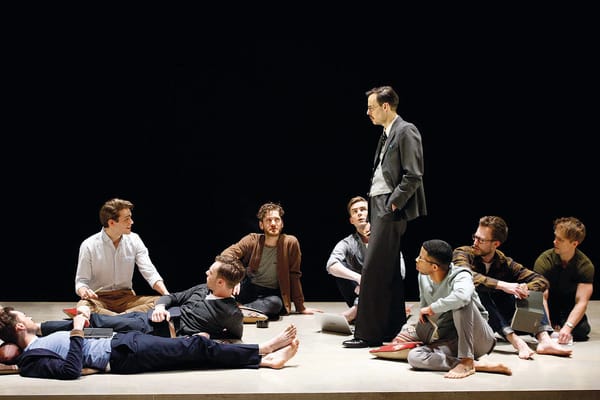Joe Hill-Gibbins takes us on a tour of hell
The National Theatre’s production of Rodney King’s bawdy mediation on isolation, Absolute Hell, has moments of magic, but they are few and far between in the bloated structure.

The National Theatre’s production of Absolute Hell, Rodney King’s jet-black dramedy set in Soho after the Second World War, begins by attempting to prove Jean-Paul Sartre’s adage that ‘hell is other people’. The entire cast – 28 people strong – line themselves up along the front of the Lyttelton Theatre’s stage, barely managing to all fit on, before launching into an a capella rendition of Édith Piaf’s ‘La Vie en Rose’, following which the curtain rises on a salubrious, battered drinking den in the heart of London.
As the introduction suggests, the play is most certainly an ensemble piece, with characters’ story arcs weaving and threading over each other, for better or worse. And the cast isn’t the only jam-packed thing about it – the production clocks in at around three hours, with two breaks, and while director Joe Hill-Gibbins manages to make it seem shorter, it maintains a sense of bloat.
Hill-Gibbins’ decision to keep things ticking along rather rapidly, making ample use of the staging to create a frenetic atmosphere, is a smart one, presumably done to make the stage seem a bit like a spinning top, liable to topple over at any second. However, what actually happens is that characters can come across as over-choreographed, the mania coming and going but always somehow leaving enough space for the main action to play out.
Out of this fog of cigarette smoke and spilled drinks, certain stand-out characters emerge: the bar, ‘La Vie en Rose’, is run by Christine Foskett (Kate Fleetwood), who veers from abrasive to humble, blaring out drink orders one minute and baring her soul the next. She is joined by Hugh Marriner, a gay author who hasn’t published any stories for years, and spends his nights getting drunk in La Vie en Rose, surrounded by fellow lost souls. They are supported by a varied coterie of grotesques and GIs – Liza Sadovy is wonderfully off-putting as ‘The Treacle Queen’, while Jonathan Slinger’s sleazy film director Maurice Hussey displays a razor-slash of a smile as his lecherous hands roam.
At the best of times, the stage becomes like a vast vision of hell, like something by Hieronymus Bosch, with a huge mirror to one side of the set reflecting back the action, slightly distorted and incredibly menacing. But these moments come too few and far between. There are several points where the chaos breaches through a fine veneer of artifice, and the play feels truly alive, like an Otto Dix painting – the scene at the end of the first act, where masked GIs pour into the bar is the most chilling example – but for the most part the action always feels somewhat constrained.
When Absolute Hell – initially called The Pink Room – was first performed in 1952, it all but sunk King’s career, as critics lined up to discredit it as tawdry and sordid. It wasn’t performed again for more than three decades, and in the interim relaxed censorship laws allowed King to rewrite certain parts of it, making the references to sexuality much more overt. Unfortunately, in the interim, he did little to allow the characters to put on a good show.
The script essentially circles around the same points again and again. It’s presumably done in order to highlight how crippled the characters are, trapped in their cycles of loneliness and misery, but it results in a severe and bitter lack of development, frustrating the audience. We may understand why the characters keep returning to La Vie en Rose again and again, but that doesn’t mean we want to stay there any longer than is necessary.
For a play that tests the audience’s endurance to succeed, it needs to be able to capture their attention throughout. A_bsolute Hell_ is epic in size, but not, unfortunately, in scope. While the themes it throws up are precinct – and all the more relevant today, loneliness being an eternally-modern malaise – and the casting generally impressive, King seems to be rehashing the same points over and over again. Part of the play’s nature is in its bloated structure, but one can’t help but wish Hill-Gibbins had taken a bit of a knife to the production, leaving its most affecting moments to gape open, raw and bloody.
The stage is stalked, during the majority of the play, by a sex worker walking the streets. Always looking straight ahead of her, with a dead-eyed stare, she jangles her keys in an attempt to drum up trade, prowling on the edge of the action. She looks sinister, and menacing, and – above all – tired. By the time the curtain comes down, I can sympathise.
3 Stars
Where? National Theatre When? Until 16 June How Much? £20







